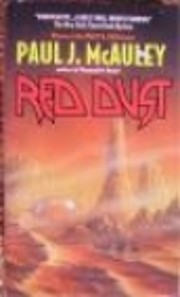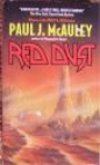

Auf ein Miniaturbild klicken, um zu Google Books zu gelangen.
|
Lädt ... Roter Staub (1993)von Paul J. McAuley
 Keine Keine aktuelle Diskussion zu diesem Buch.   ) )Grande prova di creazione fantastica applicata al vecchio (ma ancora non defunto) tema di Marte. Un'incredibile ed originale storia ricca di vicende e suggestioni, coadiuvata da uno stile ricco, evocativo ed elegante dell'autore che riesce facilmente a creare atmosfere, immagini, emozioni. La storia in se è al contempo il classico tema della ricerca, della scoperta del se e del proprio ruolo (in un contesto molto incasinato, direi) mischiato una sorta di strano miscuglio d'ispirazioni della storia cinese e della colonizzazione cino-americana (a ruoli invertiti) e cino-tibetana. Su tutto ciò McAuley c'inserisce temi quali le nanotecnologie e realtà virtuale, dilemmi etici e tesi politiche, ecologia, terra-formazione ed molto altro. Un romanzo decisamente da leggere, consigliato, unico difetto a mio parere è che a tratti è difficile seguire i complessi retroscena della narrazione. My reactions to reading this novel in 2004. The back cover of this novel quotes a Locus reviews stating that it walks a line between seriousness and parody and mentions the name of Edgar Rice Burroughs. That's all true. There is an attempt to evoke a sort of Burroughsian Martian romance here since, like Barsoom, McAuley's Mars is dying and the enslaved "humans", actually little more than biological tools for an artificial intelligence, of the lamasery reminded me of the corrupt priests in the parts of the Barsoom series I've read. Sailing on the seas of dust also reminded me of the anti-gravity ships of Burroughs' series. As a sort of taxonomic exercise, it is interesting to see how many sub-genres of sf have been cross-bred to produce this book. As well as the sections with a Burroughs flavor, one is reminded of Roger Zelazny's Lord of Light for no other reason than, at one point, protagonist Wei Lee is referred to as the Lord of Light. The off-world presence of the beloved dj/singer the King of Cats -- an Elvis simulacra that evolved from personality simulations put in self-replicating Jupiter probes to better handle data streams -- is reminiscent of the title figure from Philip K. Dick's Dr. Bloodmoney. There is more than a little cyberpunk here in the sense that we have artificial intelligences, telepresence used by machines and ais, "eidolons". Certainly, many stories have been written since William Gibson's Neuromancer in 1984 that have used cyberspace (here called "information space") as a fantasy land. I did find it interesting that this book, which in interviews McAuley called his "romantic" Mars book a la Edgar Rice Burroughs and Ray Bradbury, shares a political and thematic point of view with his hard sf, realistic The Secret of Life. Both preach the virtues of eliminating commercial and political impediments to information flow. McAuley generally takes a more bemused -- and, I think, effective propaganda-wise -- look at politics here. Lee's friend Xiao Bing goes to the big city and gets infatuated with dissidents who preach the virtues of social Darwinism and chide him for being polite and appear to be as dogmatic and heartless as the allegedly democratic capitalism of the Chinese government on Mars. (The descendants of the original American settlers -- America seemingly lost a war to China -- and imported Tibetan laborers make up the underclass.) Other political rebels can be rather heartless too. However, part of this is, even more than the free flow of information, due to the central theme of the book: change is essential, stasis is undesirable and death. The anti-biotech Luddites of The Secret of Life are presaged here by all of Earth's population retreating to the solipsistic environment of a completely virtual existence and turning their back on a living Mars and space exploration. This retreat is reminiscent of James Gunn's The Joy Makers, Michael Swanwick's Vacuum Flowers (1987), and Charles Platt's The Silicon Man (1991). There are some problems in this amazingly fecund novel. All in all, a pretty good book and definitely a worthy Mars novel. Paul J. McAuley's brilliant Red Dust weaves and blends elements of cyberpunk, planetary romance, and hard SF into a virtually flawless epic. One of the best reads I've encountered in a very long time. http://infinityparadox.blogspot.com Zeige 4 von 4 keine Rezensionen | Rezension hinzufügen
Gehört zu Verlagsreihen
A science fiction adventure story set on a terraformed Mars in the far future from the award-winning author of 'Eternal Light'. Keine Bibliotheksbeschreibungen gefunden. |
Aktuelle DiskussionenKeineBeliebte Umschlagbilder
 Google Books — Lädt ... Google Books — Lädt ...GenresMelvil Decimal System (DDC)823.914Literature English & Old English literatures English fiction Modern Period 1901-1999 1945-1999Klassifikation der Library of Congress [LCC] (USA)BewertungDurchschnitt: (3.33) (3.33)
Bist das du?Werde ein LibraryThing-Autor. |
||||||||||||||||||||||||||||||||||||||||||||||||||||||||||||||||||||||||||||||||||||||||||||||||||||||||||||||||||||||||